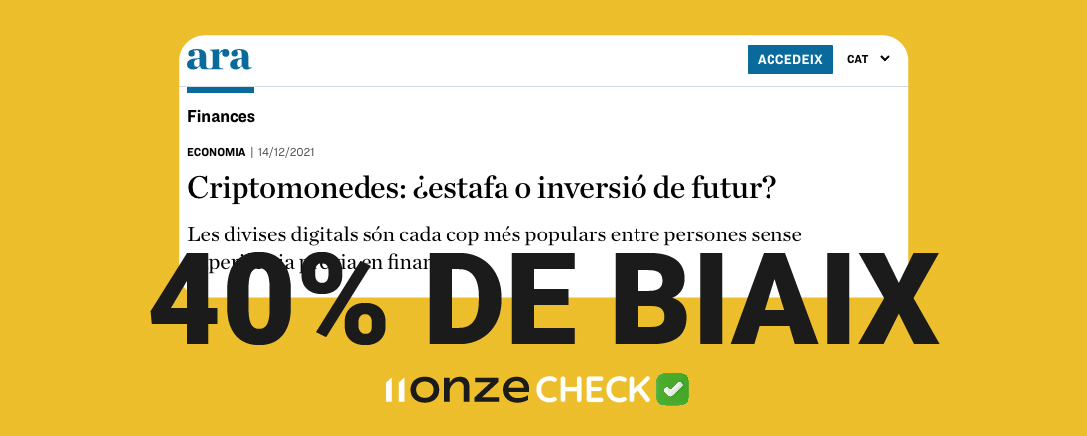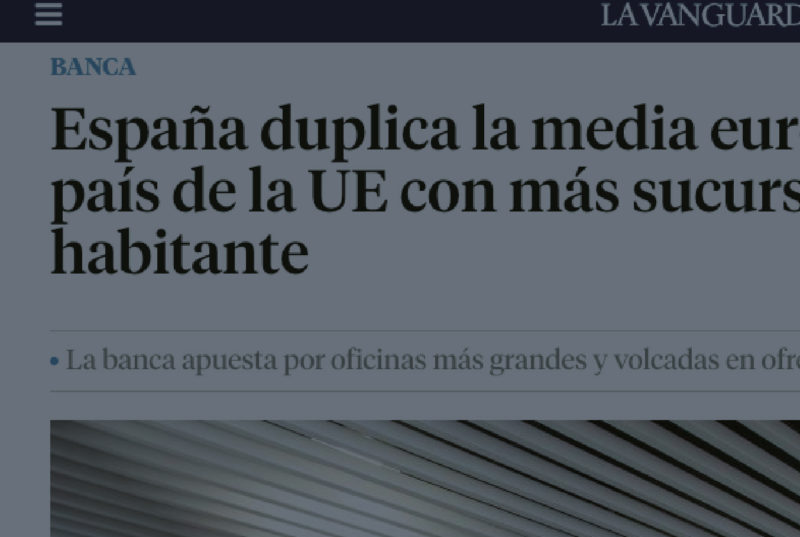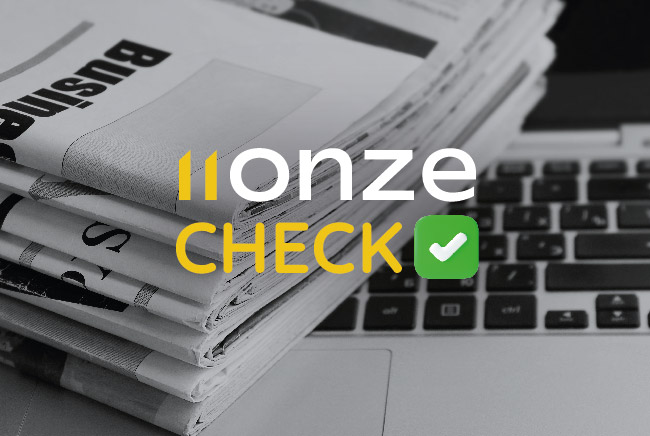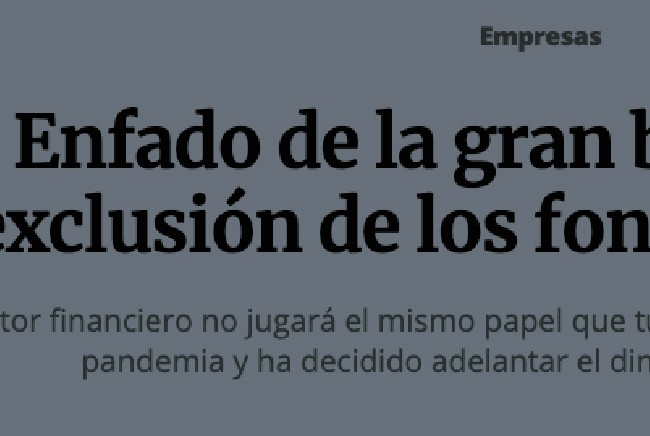

11Onze Check: The press against cryptocurrencies?
The success of the cryptocurrency phenomenon is forcing a paradigm shift in the international monetary world. The media highlight the risks of investing in cryptocurrencies, but show little interest in mentioning the advantages of these digital assets. At 11Onze Check we contrast this information by analysing an article in the ‘Diari ARA’ with the 11Onze Check Bias Method.
Cryptocurrencies are growing strongly and this, quite clearly, is not to everyone’s liking. They break the monopoly of money creation and are therefore a risk to the establishment. Historically, currencies have been used to impose some economies on others (we explained this in chapter 2 of El Diner). For example, we all know that the dollar is the world’s reserve currency and that this has allowed the United States to finance itself without much worry. Even so, the media tend to view them with suspicion.
One of the most obvious changes to the status quo, which is rarely mentioned in the media, is the fact that states and the financial institutions that serve them see their power of coercion against other states through economic sanctions, diluted. Mainly because cryptocurrencies do not depend on any central bank.
Likewise, the insecurity of cryptocurrencies is often emphasised due to their unregulated, anonymous, and for some, speculative nature. But typically it is not explained that blockchain technology makes them safer than physical currencies and highly immune to crises such as that of 2001 in Argentina, precisely because it eliminates the need for a state or banking intermediary, and allows for the democratisation of monetary policy.
The Diari ARA publication focuses on cryptocurrencies and asks whether they are a scam or an investment for the future. The title indicates the possible bias of the article, but we analyse it and explain why we conclude that it is 40% biased.
EMOTIONS
The text generates fear of cryptocurrencies. Expressions such as ‘scam’, ‘fever’, ‘pyramid scheme’, ‘tax haven in the dark’ are recurrently used. There are no positive examples. Is the reader being conditioned?
The first two paragraphs (the most read of any news item) are clearly negative, without compensation. The title and subtitle are already a statement of intent that the newspaper considers acceptable. But to see that this is not the case, you only have to change the actors. Can you imagine a headline like this: “IMF and World Bank, mafia or credit institutions?
CONTEXT
There is no mention of the decentralisation of money creation. That is to say: the authoritative quotes from Nobel Prize winners in Economics and Central Bank directors are disallowed if we realise that cryptocurrencies are, precisely, a threat to those who have always held economic power. The democratisation of currency creation would put an end to the banking monopoly. It is expected that the heads of Central Banks do not like it, but can we trust them?
Nor do they talk about the security of cryptocurrencies. The fact that they are based on blockchain makes them safer than many physical currencies at times when there is a debt overhang that probably cannot be supported by a central currency. There is no explanation, therefore, that perhaps real money is not worth what we think it is worth.
METHODOLOGY
The article relies on authoritative quotes, but we do not know on what basis they make these opinions which, as it turns out, could not be based on facts. We are also not linked to the original statements, so we cannot verify them.
INTENTION
Taking a look at the Diari ARA it is easy to find advertisements from traditional banks, which are the main interested parties in making sure cryptocurrencies are not a success. Can the ARA have some hidden interest in generating distrust towards cryptocurrencies?
No company or product can ignore the influence that the media has on its popularity, both good and bad news can have a significant effect on its value and public perception, especially when it comes to investment crypto assets such as cryptocurrencies.
Beyond the sensational headlines caused by large rises or falls in the value of some cryptocurrencies, and the rapid growth of the cryptocurrency sector, especially Bitcoin, we cannot forget that cryptocurrencies, unlike traditional currencies, are not regulated by any central authority, and this makes them especially sensitive to popular perception often influenced by the media.
While it is perfectly reasonable to explain the risk associated with investing our money in cryptocurrencies, it would also be logical to point out the economic advantages not only on an individual level, such as reduced fees, but also generally speaking.
The global character and above all the decentralised nature of cryptocurrencies, free from the influence and regulation of central banks and therefore with limited interference from public authorities, shakes the financial monopoly of states and global financial institutions such as the IMF and the World Bank, which are opposed to cryptocurrencies as long as they are not cryptocurrencies under their control.
If you want to know the Bias Method, which we have used to contrast this information, you will find it here. If you want to send us economic information to verify, you can do so by writing to us at: [email protected]
11Onze is the community fintech of Catalonia. Open an account by downloading the super app El Canut for Android or iOS and join the revolution!






Sí, la premsa com tot lo nou ho presenta negativament, igual que la inclusió de les criptomonedes al metavers, fet que permetria als rusos esquivar les sancions per la desregularització de les criptomonedes, ara bé, la resta que no som rusos no tenim la culpa, caldria q ho tinguessin en compte i ens permitesin operar als q no som rusos https://www.20minutos.es/tecnologia/actualidad/estados-unidos-podria-prohibir-el-bitcoin-en-pleno-auge-de-la-criptomoneda-por-el-conflicto-con-rusia-4965194/
L’excusa de posar restriccions per Rússia, és la mateixa excusa de posar restriccions per la Xina i la mateixa excusa de posar restriccions per la UE quan la UE volia evitar que els EUA es carreguessin el JCPO cercant sistemes de pagament alternatius al dòlar. En altres paraules, un poder hegemònic aferrant-se a la poltrona perquè no canviï l’statu quo unipolar que fa aigües, volent controlar el que ja no es pot controlar. Per sort, en un món multipolar no es poden posar portes al camp.
Fa 5 mesos de l’article i continuen igual.
Els diaris són uns venuts.
S’ha de denunciar dia si i dia també el problema que suposen els mitjans de desinformació
catalans i espanyols
Gràcies pel teu suport i la teva reflexió, Mercè!
👏
Molt interessant.
Celebrem que t’hagi agradat, Joaquim!!!
Bon article. En el camp Crypto sí que ens cal molta formació. Gràcies 11!
Gràcies a tu, Josep! Ho tindrem en compte per a propers vídeos 🙂
Molt interessant. Sempre cal analitzar els “experts” i treure conclusions. Tothom te interessos, esta bé saber qui els te globals per benefici de tots o particulars per el gaudi d’uns pocs.
Celebrem que t’hagi agradat, Pere!!!
Els bancs paguen als mitjans de comunicació perque escriguin el que ells volen. Fot fastic.
Fa molts anys que és així, segurament que masses… Moltes gràcies pel teu comentari, Jordi!!!
D. això s’en diu “FUD” Fear, Uncertainty & Doubt, la vella recepte de sempre… Bona explicació la que heu fet, moltes gràcies!
Gràcies a tu, Joan
El sistema d’anàlisi del BIAIX és bo i cal practicar-lo per saber què ens diuen o callen determinades informacions. M’ha agradat l’article
Celebrem que t’hagi agradat l’article, Francesc!!!
Més senzill del que ens expliquen els mitjans “interessats”.
Moltes gràcies pel teu comentari, Cristòfol!!!
Tot ben clar!
Celebrem que t’hagi agradat, Cristòfol!!!
Un article molt interesant. Gràcies
Moltes gràcies, Manuel
Enhorabona! Ja he posat l’11onze als favorits de notícies, tan per qualitat, objectivitat i promoure el pensament crític de les notícies que ens ‘venen’. Aviam quan una anàlisi de biaix sobre com TV3 informa de Xina. Seguim!
Gràcies, Jaume! És un plus de motivació per a nosaltres llegir coses així!
👏🏿👏🏿🙏🏿
Sempre seran penalitzades són l’alliberació del poder econòmic de sempre,el sistema no les pot admetre
El problema per alguns i ventatge per altres. Ja hi són en aquest sistema las criptomonedas, i regularitzades en curs en varis països
Ok 👍
No interessa al sistema fer ressò positiu de las criptomonedas
Un comentari molt encertat, Josep. Crec que fins i tot ells saben que, com a molt, poden endarrerir allò que és inevitable. I és possible que aquesta sigui la seva estratègia, per tal de guanyar temps en el seu posicionament sobre aquest perill pel seu status quo.
👌